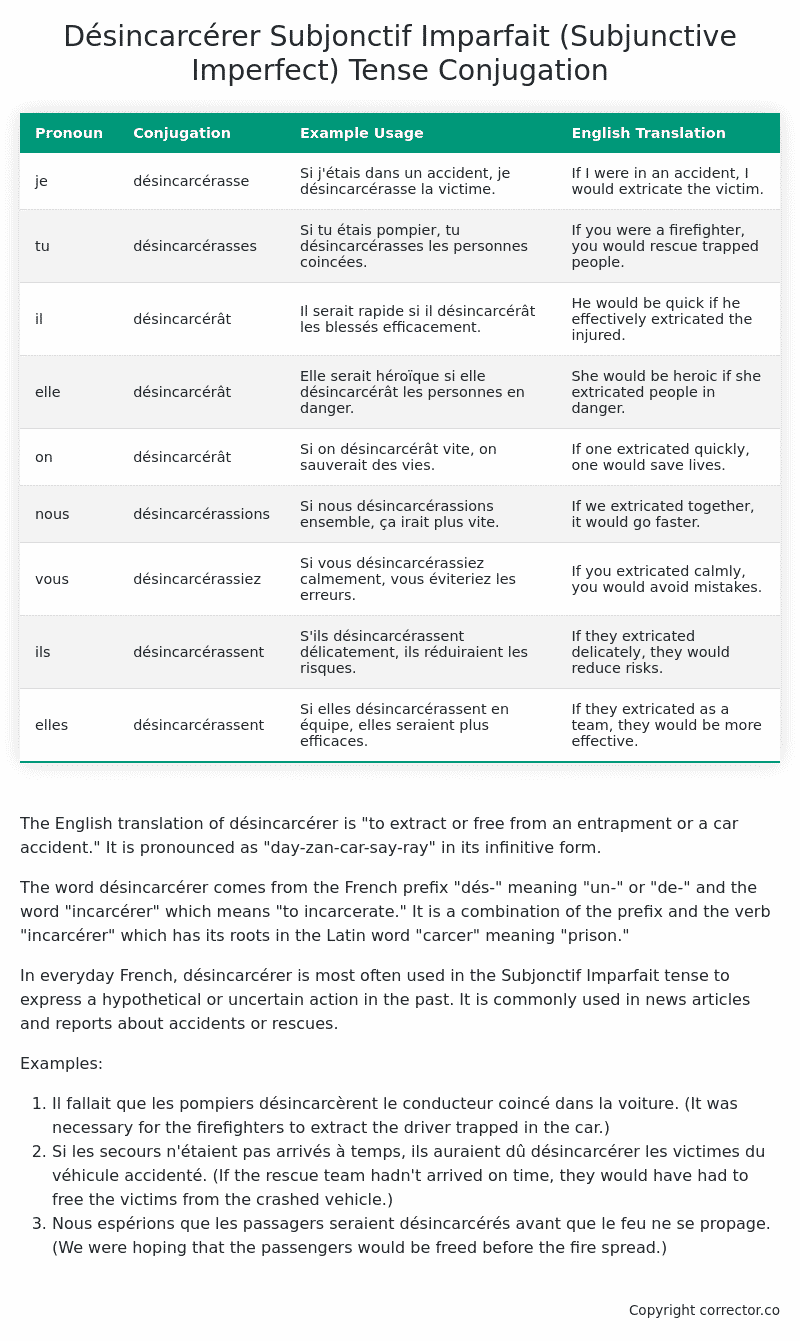Subjonctif Imparfait (Subjunctive Imperfect) Tense Conjugation of the French Verb désincarcérer
Introduction to the verb désincarcérer
The English translation of désincarcérer is “to extract or free from an entrapment or a car accident.” It is pronounced as “day-zan-car-say-ray” in its infinitive form.
The word désincarcérer comes from the French prefix “dés-” meaning “un-” or “de-” and the word “incarcérer” which means “to incarcerate.” It is a combination of the prefix and the verb “incarcérer” which has its roots in the Latin word “carcer” meaning “prison.”
In everyday French, désincarcérer is most often used in the Subjonctif Imparfait tense to express a hypothetical or uncertain action in the past. It is commonly used in news articles and reports about accidents or rescues.
Examples:
- Il fallait que les pompiers désincarcèrent le conducteur coincé dans la voiture. (It was necessary for the firefighters to extract the driver trapped in the car.)
- Si les secours n’étaient pas arrivés à temps, ils auraient dû désincarcérer les victimes du véhicule accidenté. (If the rescue team hadn’t arrived on time, they would have had to free the victims from the crashed vehicle.)
- Nous espérions que les passagers seraient désincarcérés avant que le feu ne se propage. (We were hoping that the passengers would be freed before the fire spread.)
Table of the Subjonctif Imparfait (Subjunctive Imperfect) Tense Conjugation of désincarcérer
| Pronoun | Conjugation | Example Usage | English Translation |
|---|---|---|---|
| je | désincarcérasse | Si j’étais dans un accident, je désincarcérasse la victime. | If I were in an accident, I would extricate the victim. |
| tu | désincarcérasses | Si tu étais pompier, tu désincarcérasses les personnes coincées. | If you were a firefighter, you would rescue trapped people. |
| il | désincarcérât | Il serait rapide si il désincarcérât les blessés efficacement. | He would be quick if he effectively extricated the injured. |
| elle | désincarcérât | Elle serait héroïque si elle désincarcérât les personnes en danger. | She would be heroic if she extricated people in danger. |
| on | désincarcérât | Si on désincarcérât vite, on sauverait des vies. | If one extricated quickly, one would save lives. |
| nous | désincarcérassions | Si nous désincarcérassions ensemble, ça irait plus vite. | If we extricated together, it would go faster. |
| vous | désincarcérassiez | Si vous désincarcérassiez calmement, vous éviteriez les erreurs. | If you extricated calmly, you would avoid mistakes. |
| ils | désincarcérassent | S’ils désincarcérassent délicatement, ils réduiraient les risques. | If they extricated delicately, they would reduce risks. |
| elles | désincarcérassent | Si elles désincarcérassent en équipe, elles seraient plus efficaces. | If they extricated as a team, they would be more effective. |
Other Conjugations for Désincarcérer.
Le Present (Present Tense) Conjugation of the French Verb désincarcérer
Imparfait (Imperfect) Tense Conjugation of the French Verb désincarcérer
Passé Simple (Simple Past) Tense Conjugation of the French Verb désincarcérer
Passé Composé (Present Perfect) Tense Conjugation of the French Verb désincarcérer
Futur Simple (Simple Future) Tense Conjugation of the French Verb désincarcérer
Futur Proche (Near Future) Tense Conjugation of the French Verb désincarcérer
Plus-que-parfait (Pluperfect) Tense Conjugation of the French Verb désincarcérer
Passé Antérieur (Past Anterior) Tense Conjugation of the French Verb désincarcérer
Futur Antérieur (Future Anterior) Tense Conjugation of the French Verb désincarcérer
Subjonctif Présent (Subjunctive Present) Tense Conjugation of the French Verb désincarcérer
Subjonctif Passé (Subjunctive Past) Tense Conjugation of the French Verb désincarcérer
Subjonctif Imparfait (Subjunctive Imperfect) Tense Conjugation of the French Verb désincarcérer (this article)
Conditionnel Présent (Conditional Present) Tense Conjugation of the French Verb désincarcérer
Conditionnel Passé (Conditional Past) Tense Conjugation of the French Verb désincarcérer
L’impératif Présent (Imperative Present) Tense Conjugation of the French Verb désincarcérer
L’infinitif Présent (Infinitive Present) Tense Conjugation of the French Verb désincarcérer
Struggling with French verbs or the language in general? Why not use our free French Grammar Checker – no registration required!
Get a FREE Download Study Sheet of this Conjugation 🔥
Simply right click the image below, click “save image” and get your free reference for the désincarcérer Subjonctif Imparfait tense conjugation!

Désincarcérer – About the French Subjonctif Imparfait (Subjunctive Imperfect) Tense
Formation
Common Everyday Usage Patterns
Interactions with Other Tenses
Subjonctif Présent
Indicatif Passé Composé
Conditional
Conditional Perfect
Summary
I hope you enjoyed this article on the verb désincarcérer. Still in a learning mood? Check out another TOTALLY random French verb conjugation!


